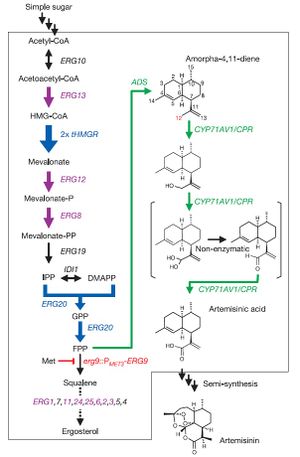CH391L/S12/Artemisinic Acid Engineering: Difference between revisions
No edit summary |
No edit summary |
||
| Line 3: | Line 3: | ||
*NOTE* Page is still under construction. As long as this note appears, assume information presented on this page is incomplete and unreliable. | *NOTE* Page is still under construction. As long as this note appears, assume information presented on this page is incomplete and unreliable. | ||
== | ==Artemisia== | ||
Artemisia is a genus that encompass a broad range of plants commonly known as sagebrush, sagewort, and wormwood. The family, which derives its name from the either from the Greek goddess Artemis or Artemisia, the wife of Mausolus, includes many famous plants. <i>Artemisia absinthium</i> is used in the production of Absinthe, and Shakespeare employed wormwood as a cure for the love potion in Midsummer's Night Dream. One species of Artemisia, known as <i>Artemsiai annua</i>, has been used for thousands of years in traditional Chinese medicines to cure headaches. | Artemisia is a genus that encompass a broad range of plants commonly known as sagebrush, sagewort, and wormwood. The family, which derives its name from the either from the Greek goddess Artemis or Artemisia, the wife of Mausolus, includes many famous plants. <i>Artemisia absinthium</i> is used in the production of Absinthe, and Shakespeare employed wormwood as a cure for the love potion in Midsummer's Night Dream. One species of Artemisia, known as <i>Artemsiai annua</i>, has been used for thousands of years in traditional Chinese medicines to cure headaches. | ||
| Line 9: | Line 9: | ||
[[Image:Artemisia_Annua.jpg|thumb|left|<i>Artemisia annua</i>, a common wormwood found in the temperate province of China, Hubei. Image from Wikipedia Commons.]] | [[Image:Artemisia_Annua.jpg|thumb|left|<i>Artemisia annua</i>, a common wormwood found in the temperate province of China, Hubei. Image from Wikipedia Commons.]] | ||
This last species is of particular interest to synthetic biologists, due to its ability to produce | This last species is of particular interest to synthetic biologists, due to its ability to produce Artemisinin. | ||
===Artemisinin=== | |||
http://www.ncbi.nlm.nih.gov/UniGene/UGOrg.cgi?TAXID=35608 | http://www.ncbi.nlm.nih.gov/UniGene/UGOrg.cgi?TAXID=35608 | ||
| Line 23: | Line 25: | ||
There has been no incidence of previous iGEM teams investigating Artemisinin or any of its precursors. Many iGEM teams have referenced Ro et al., but only as an example of pathway engineering, or in order to discuss ethics and synthetic biology's potential to positively benefit society. No parts in the parts registry deals with Artemisinin either. Only one [[http://partsregistry.org/wiki/index.php/Part:BBa_K258002 set of parts]] mentions a protein, Granulysin, which can <i>potentially</i> be used to fight Malaria. | There has been no incidence of previous iGEM teams investigating Artemisinin or any of its precursors. Many iGEM teams have referenced Ro et al., but only as an example of pathway engineering, or in order to discuss ethics and synthetic biology's potential to positively benefit society. No parts in the parts registry deals with Artemisinin either. Only one [[http://partsregistry.org/wiki/index.php/Part:BBa_K258002 set of parts]] mentions a protein, Granulysin, which can <i>potentially</i> be used to fight Malaria. | ||
==References== | ==References== | ||
<biblio> | <biblio> | ||
Revision as of 14:13, 8 April 2012
- NOTE* Page is still under construction. As long as this note appears, assume information presented on this page is incomplete and unreliable.
Artemisia
Artemisia is a genus that encompass a broad range of plants commonly known as sagebrush, sagewort, and wormwood. The family, which derives its name from the either from the Greek goddess Artemis or Artemisia, the wife of Mausolus, includes many famous plants. Artemisia absinthium is used in the production of Absinthe, and Shakespeare employed wormwood as a cure for the love potion in Midsummer's Night Dream. One species of Artemisia, known as Artemsiai annua, has been used for thousands of years in traditional Chinese medicines to cure headaches.

This last species is of particular interest to synthetic biologists, due to its ability to produce Artemisinin.
Artemisinin
http://www.ncbi.nlm.nih.gov/UniGene/UGOrg.cgi?TAXID=35608

Production Procedure
In a famous paper released by Ro et al., Saccharomyces cerevisiae was engineered to produced artemisinic acid from simple sugars.
Previous iGEM Examples
There has been no incidence of previous iGEM teams investigating Artemisinin or any of its precursors. Many iGEM teams have referenced Ro et al., but only as an example of pathway engineering, or in order to discuss ethics and synthetic biology's potential to positively benefit society. No parts in the parts registry deals with Artemisinin either. Only one [set of parts] mentions a protein, Granulysin, which can potentially be used to fight Malaria.
References
- Ro DK, Paradise EM, Ouellet M, Fisher KJ, Newman KL, Ndungu JM, Ho KA, Eachus RA, Ham TS, Kirby J, Chang MC, Withers ST, Shiba Y, Sarpong R, and Keasling JD. Production of the antimalarial drug precursor artemisinic acid in engineered yeast. Nature. 2006 Apr 13;440(7086):940-3. DOI:10.1038/nature04640 |
- Chang MC, Eachus RA, Trieu W, Ro DK, and Keasling JD. Engineering Escherichia coli for production of functionalized terpenoids using plant P450s. Nat Chem Biol. 2007 May;3(5):274-7. DOI:10.1038/nchembio875 |